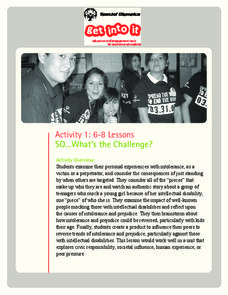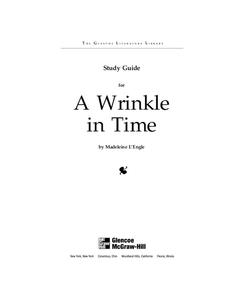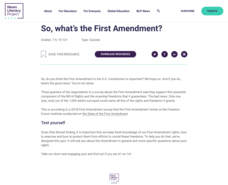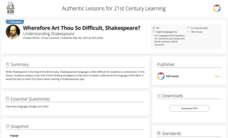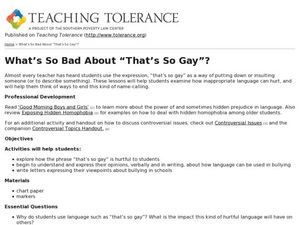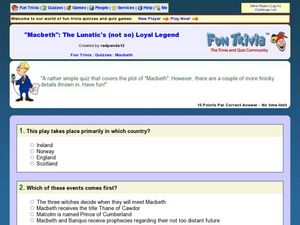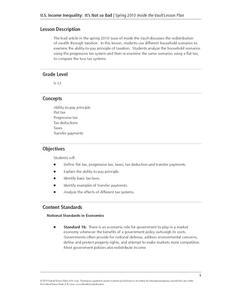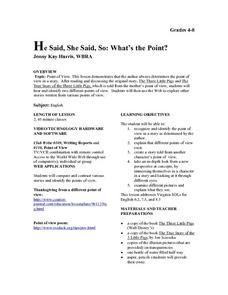Special Olympics
SO…What’s the Challenge?
Whose responsibility is it to protect equal rights? Class members engage in a series of activities that create awareness of the prejudice and intolerance persons with disabilities face. They then create a message addressed to their...
Facing History and Ourselves
Hands Up, Don't Shoot!
Why is it so difficult to develop a clear understanding of the events surrounding the shooting of Michael Brown by a Ferguson, Missouri, police officer? To answer this question class members listen to a NPR discussion of the findings of...
New York City Department of Education
What Did I Do to Be so Black and Blue: How Did Jazz Influence Ralph Ellison's Invisible Man
How did jazz influence Ralph Ellison's Invisible Man? Class members read some of Ellison's non-fiction writings about blues and jazz, listen to records, watch videos, and engage in student-centered discussions. They then produce podcasts...
University of Georgia
What's So Special about Bottled Drinking Water?
Is artesian water designed to be better, or is it just from wells similar to those in the city of Artesium? This experiment looks at many different types of bottled waters, including artesian. Using a soap mixture, scholars test to see...
Science 4 Inquiry
Carbon and Climate
The carbon cycle is natural and has happened for millions of years, so can humans change it? Young scientists play the role of carbon as they travel through the carbon cycle. They complete two rounds, once before the industrial...
Science 4 Inquiry
Layers of the Earth
We can't dig a hole through the Earth, so how do we know about the layers beneath our feet? Scholars learn about layering through hands-on exploration of common materials. They study the characteristics of each layer and apply their...
Heritage Foundation
Courts and Judges
If the Supreme Court is so supreme, why do all cases not just start there? High schoolers learn why every case does not start at the Supreme Court as well as the importance of hierarchy in the US judicial system in the 11th installment...
iCivics
Step Two: The News and You
With so many news resources, scholars likely feel incredibly confused about what the news means. Pupils participate in reading activities, fill out graphic charts, answer questions on worksheets, and complete a quick write activity.
Houghton Mifflin Harcourt
Songwriting Skill - Choosing a Tone: Jordan Pruitt - “One Love”
"Tone means attitude." Or so says this resource that uses Jordan Pruitt's "One Love" to model for songwriters how to develop an attitude in their lyrics. Class members engage in a number of exercises designed to give them direct and...
Smarter Balanced
How the Brain Works
Cerebrum, cerebellum, brainstem, pituitary gland, and spinal cord. Prepare your class for a performance task assessment on the brain and how it works with a scripted plan that defines these terms and identifies the functions the parts...
McGraw Hill
Study Guide for A Wrinkle in Time
Mrs. Who, Mrs. Whatsit, and Mrs. Which would not be so confused if they had a study guide as great as this. Scholars increase their comprehension of A Wrinkle In Time through many supports such as guided questions, background...
News Literacy Project
So, What’s the First Amendment?
The First Amendment to the US Constitution protects people's rights to speech, the press, and religion. Using the resource, scholars discover how. They take a brief online quiz to determine how well they understand the First Amendment.
Federal Reserve Bank
So How Much Are You Really Paying for that Loan?
Loans are rarely provided without a cost. Pupils evaluate the high cost of using a payday loan or payday advance through discussion and worksheets, and finally work in groups to develop short public service announcements that outline the...
K20 LEARN
Wherefore Art Thou So Difficult, Shakespeare? Understanding Shakespeare
'Tis not easy to understand the language of the Bard! But, hark! Fret not! With the assistance of this joyous activity, young players learn how to translate Shakespeare's English into modern language. Groups examine passages from Julius...
Curated OER
What’s So Bad About “That’s So Gay”?
Students explore the concept of inappropriate language. In this prejudice in language lesson, students examine how the phrase "That's so gay" is language that hurts others.
Curated OER
What's So Bad or Good About Conflict?
Learners of all ages discuss how conflict can be negative and positive. First, they create a class bulletin board about conflict, and provide their thoughts and connotations surrounding the word. In a class discussion, they ask questions...
Curated OER
Macbeth: The Lunatic's (not so) Loyal Legend
Fifteen questions cover the events from The Tragedy of Macbeth. Most are plot-based reading comprehension questions, but a few ask for missing words from a quote. Good luck!
Next Generation Science Storylines
How Can We Sense so Many Different Sounds from a Distance?
Dive into the mystery of sound waves! Scholars brainstorm questions about how sound travels and why different items make different sounds. They then conduct experiments to answer their questions.
Curated OER
"So, What Do You Think?"
Take a stand! Even the most reluctant speakers find their voices if the topics are engaging. Use pictures, photos, or word prompts (I think pizza is the best lunch on the school menu. What do you think?) to stir responses. Encourage...
Curated OER
Cool and Not-So-Cool Materials
Why do some materials feel cool to the touch, but not others? Learn about thermal conductors and thermal insulators with a fun science experiment. First, kids read the results of an experiment with spoons and hot water. They then try...
Federal Reserve Bank
U.S. Income Inequality: It's Not So Bad
What is the difference between a flat tax, progressive tax, tax deduction and transfer payments? Pupils examine the ability-to-pay principle of taxation through discussion, problem solving, and a variety of worksheets on topics from US...
Curated OER
He Said, She Said, So: What's the Point?
Not by the hair on my chinny chin chin! Upper graders and middle schoolers read the story The Three Little Pigs and other tales related to the story from various points of view. They use the Internet to find more stories from...
Curated OER
So Much Depends Upon...Sixteen-Word Imagery Poems Inspired by Love that Dog by Sharon Creech
After reading Love That Dog by Sharon Creech (and possibly shedding a few tears), middle schoolers work on their own sixteen-word poems with a Six Trait writing activity. They focus on word choice in this activity to capture an...
Curated OER
Multiplication: Bugs Can Multiply, So Can I!
Develop multiplication skills with your class. Youngsters will visualize multiplication as repeated addition. Then they will create a multiplication bug book and discover arrays as a strategy for multiplication problem solving....
Other popular searches
- Just So Stories
- Somebody Wanted but So
- Vocabulary Exercises So That
- So La
- So Because Although But
- So Far From the Bamboo Grove
- So Youre a Decomposer
- But So
- Rudyard Just So Stories
- Writing Just So Stories
- Not So Jolly Roger
- Just So Stories Kipling


